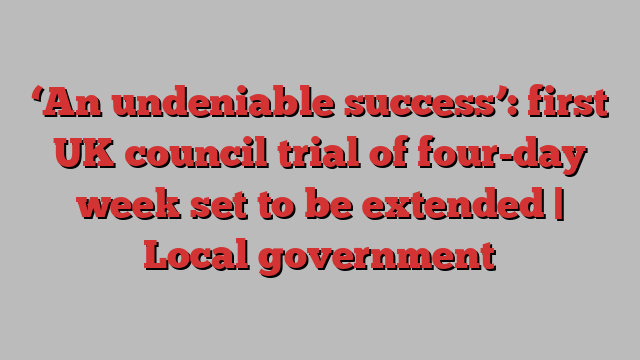
The first UK council to experiment with a four-day working week is expected to extend the trial after analysis showed it was “overwhelmingly positive” for staff health and wellbeing without denting performance.
About 450 mainly desk-based employees of the Liberal Democrat-led South Cambridgeshire council embarked on the three-month pilot in January. They could choose to take Monday or Friday off and were expected to work more productively in the remaining four days. Their pay was not affected.
Papers prepared for the council’s employment and staffing committee, which is due to meet on 2 May, recommend that the trial be extended for another 12 months. They also suggest that workers involved in refuse collection be invited to join a separate, three-month pilot of the four-day week.
“I am really pleased with the way this trial’s gone,” said the council’s leader, Bridget Smith. “We look at those 52 days off a year not as a right but as a gift, for working much more intensely and working smarter.”
She said informal chats with staff suggested many were keeping their extra day off as a “special day” to spend extra time with family or enjoy leisure activities that they would not previously have been able to do.
Survey results showed 88.5% of staff wanted the trial to continue, with women and older workers apparently seeing the most benefits, while the impact on health and wellbeing was “overwhelmingly positive”.
Meanwhile, an independent analysis of the council’s performance data by the Bennett Institute at the University of Cambridge showed it was “within normal levels compared to the average over time”.
Joe Ryle, the director of the 4 Day Week Campaign, said: “South Cambridgeshire’s historic trial has been an undeniable success and it paves the way for other councils across the country to follow their lead.”
There were some teething problems. Younger workers and new recruits reported feeling less confident with tackling problems at work while on the four-day working pattern, while part-time workers were not as enthusiastic about the trial even though they were also offered the chance to reduce their hours by 20%.
However, the council hopes such issues can be mitigated in the longer term and that the new working pattern could save money by making recruitment and retention easier, cutting the cost of employing agency staff.
Smith said 20% of council vacancies currently went unfilled. The council’s analysis of the trial notes that as of August last year, 23 agency staff were employed to cover vacant roles, at an annual cost of more than £2m.
“If we filled those posts with permanent staff, we’d have an extra £1m,” Smith said. “£1m in local government terms is a heck of a lot of money and I can do an awful lot of good stuff with £1m.”
after newsletter promotion
She said the number of staff saying they were thinking of leaving the council fell significantly over the three-month trial period.
The council’s decision to experiment with the new working pattern came after a successful six-month pilot last year by more than 60 employers, most in the private sector, with the overwhelming majority opting to continue with it.
If the South Cambridgeshire trial is extended to waste services – including bin collections – its staff would work 32 hours over four days, a 16.5% reduction in their current hours. It would require the approval of nearby Cambridge city council.
Smith said the council would use algorithms to replan bin collection routes, and she pointed out that many councils already collected bins on only four days of the week.
A final decision on whether to extend the pilot is expected to be taken by the council’s cabinet on 15 May.